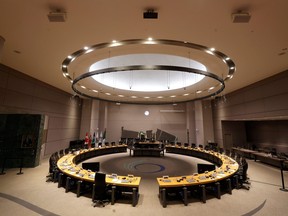Closing a downtown street to vehicles for the summer has met with skepticism from some businesses, says Ariel Troster. Let them know your views.

Article content
Why can’t Ottawa be more like Montreal? I get asked this question all the time, as my neighbours look enviously at that city’s extensive network of safe cycling paths and pedestrianized streets.
In Montreal, many streets that used to be loud and filled with gas fumes are now quiet and lined with flowers. Roads that used to cut through parks are now replaced with serene walking paths. Commercial thoroughfares such as Mont-Royal, Duluth and Sainte-Catherine Street have become completely pedestrianized during summer months, replacing gridlock traffic with outdoor stages, playful art installations and comfortable seating.
Advertisement 2
Article content
How do we make fun stuff like this happen in Ottawa? The answer is a bit complicated – because we have a very different municipal political system here. When I spoke with a Montreal city councillor last summer and asked him what kind of public consultation they did before pedestrianizing streets, he said, “We didn’t.”
Montreal has political parties at the municipal level and is governed by a series of borough councils. When Projet Montréal won a majority in the Plateau, it set about implementing its political priorities. That included building out bike lanes and pedestrianizing streets. When its members won a majority on city council, they did the same thing city-wide. Their political majority was enough to give them the power to implement change. Montreal’s government decided that the best way to test out an idea was to do it. And sure enough, their initiatives were wildly popular. The city scaled up the program this summer, pedestrianizing 11 major streets.
Ottawa is an amalgamated city with a huge landmass and significant differences between urban and rural communities. We have no political party system, so the way we get direction on major initiatives is to consult with the community, then vote at the council table. If I want to close a road for a night market or festival, I need to get 24 councillors and the mayor to vote on it. While this approach may be more democratic, it takes much more time and it often seems like we are consulting to death.
Advertisement 3
Article content
During the pandemic, the city was able to cut through some of these laborious processes to create more outdoor gathering spaces when indoor dining was quite dangerous. Council liberalized the rules around patios, enabling restaurants to offer outdoor dining. The city also made it easier to close streets to cars, providing the Business Improvement Area or two-thirds of businesses on the street asked to do so.
I am currently working with the Somerset Village BIA to try for consensus on closing part of Somerset Street West for the summer between O’Connor and Bank streets, so restaurants can expand their patios, and so local merchants and community organizations can run outdoor markets, skateboard lessons, ping-pong games, drag shows and other fun activities.
When the BIA and I met with business owners to explain the project, I hit a wall of doubt, even though we found alternate parking half a block away for affected business owners. This was notwithstanding the fact that the city offered $100,000 to pay for public realm enhancements to support programming. And despite the fact that a summer closure would only remove roughly five parking spaces. Evidence from around the world shows that pedestrianized streets are actually better for business. A study done by Transport for London shows that people walking, rolling and cycling, and using public transit spend 40 per cent more each month than car drivers. Similar numbers have also been replicated in studies in Toronto and in New York City.
Advertisement 4
Article content
Ottawa has just hired as our city’s first-ever nightlife commissioner Mathieu Grondin, who also happens to be a veteran of the Montreal art and music scene. I hope he can help us capture some of the playful, vibrant energy of his home city.
Residents ask me all the time how we can have more dynamic, welcoming and safe places downtown. The answer is that we need people to get loud and demand change. When you frequent neighbourhood restaurants or shops, tell business owners if you biked, walked or rolled there. And if you happen to find yourself on Somerset between Bank and O’Connor, let business owners know that you would be more likely to dine or shop there if the street were open to people.
I often say that trying to make change in this city is like pushing a boulder up a hill. But we will get there if we work together.
Ariel Troster is the city councillor for Somerset Ward.
Recommended from Editorial
Article content





